With more than 27 years of experience across horticulture, sports turf, and education, Victoria Fiander has built a remarkable career defined by resilience, adaptability, and passion. From her early days as a garden centre manager to running large-scale sports turf projects in Asia, Victoria has shown how determination and transferable skills can open unexpected doors. Today, she’s focused on education, mentoring the next generation of greenkeepers and horticulturalists, and continuing to champion diversity and inclusivity in the industry.
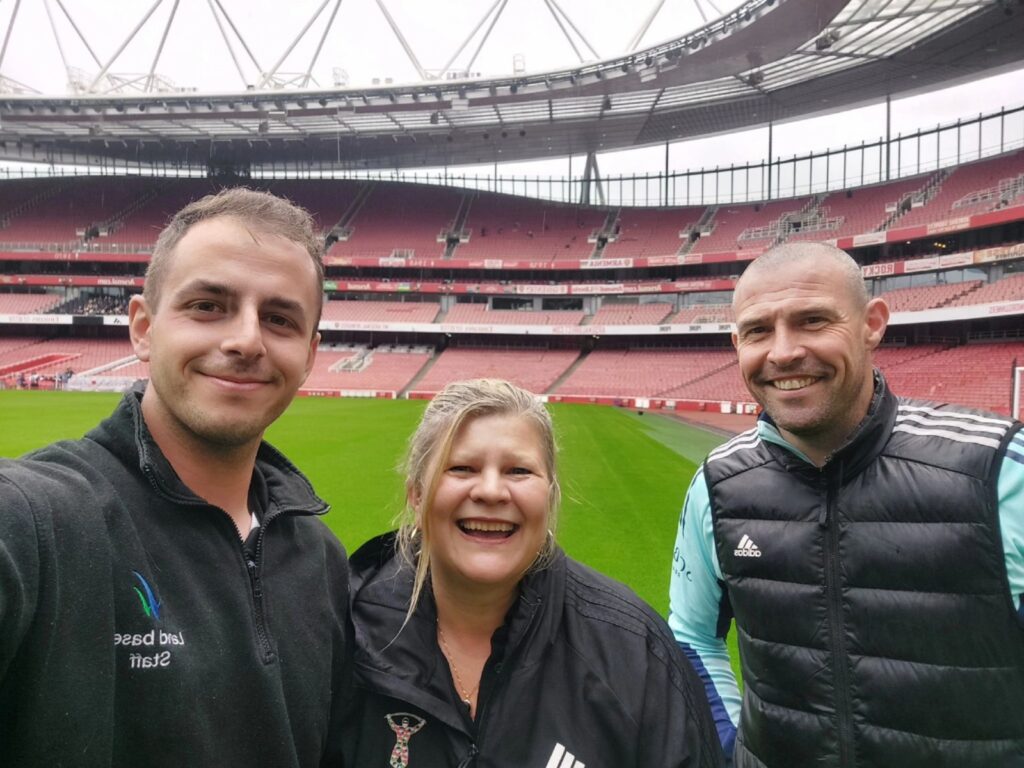
Q: Victoria, could you start by introducing yourself and how you first got into the industry?
I’ve been in the industry for 27 years and have been lucky enough to work across many different sectors. I never actually set out to work in horticulture—it just happened by chance. My first role was as a garden centre manager at Homebase, which remains one of my favourite jobs. Back then, Sainsbury’s owned Homebase, and they were brilliant employers who gave us thorough training and strong mentoring. It really set me up with a foundation of skills that I carried forward when I later became self-employed and started running my own company.
Q: You also spent time working in Asia. How did that opportunity come about?
A: That was never part of the plan. I grew up on a farm, so I was always outside, riding horses, looking after animals, building dry stone walls with my dad. I didn’t do well at school because sitting in a classroom didn’t suit me, and I was written off academically. But when I went to Hadlow College later on, I thrived because I was finally being taught in a way that suited me.
I ended up in Asia because of my then-husband’s career ambitions. When the marriage broke down, I was left with three children to support on my own. At that point, my main focus was keeping a roof over our heads and food on the table. I took on 27 hectares of sports turf because the money was good, even though I didn’t have machinery or prior experience in that area. I had to make it work, and I did.
Q: What were some of the biggest challenges working in Asia compared with the UK?
A: I was definitely unique—I didn’t see other women working as turf contractors there. Machinery availability was a huge challenge, so a lot of the work had to be done by hand. You learn quickly to manage water, soil, and grass health with whatever resources you have. I relied heavily on observation, using my eyes, hands, and even smell to understand what the grass needed.
Another challenge was proving myself in a male-dominated environment. I remember being told a 29-horsepower mower couldn’t possibly cut and aerate at the same time. I thought differently, and when I tested it, I proved them wrong. It was satisfying to show that I could achieve results that others doubted were possible.
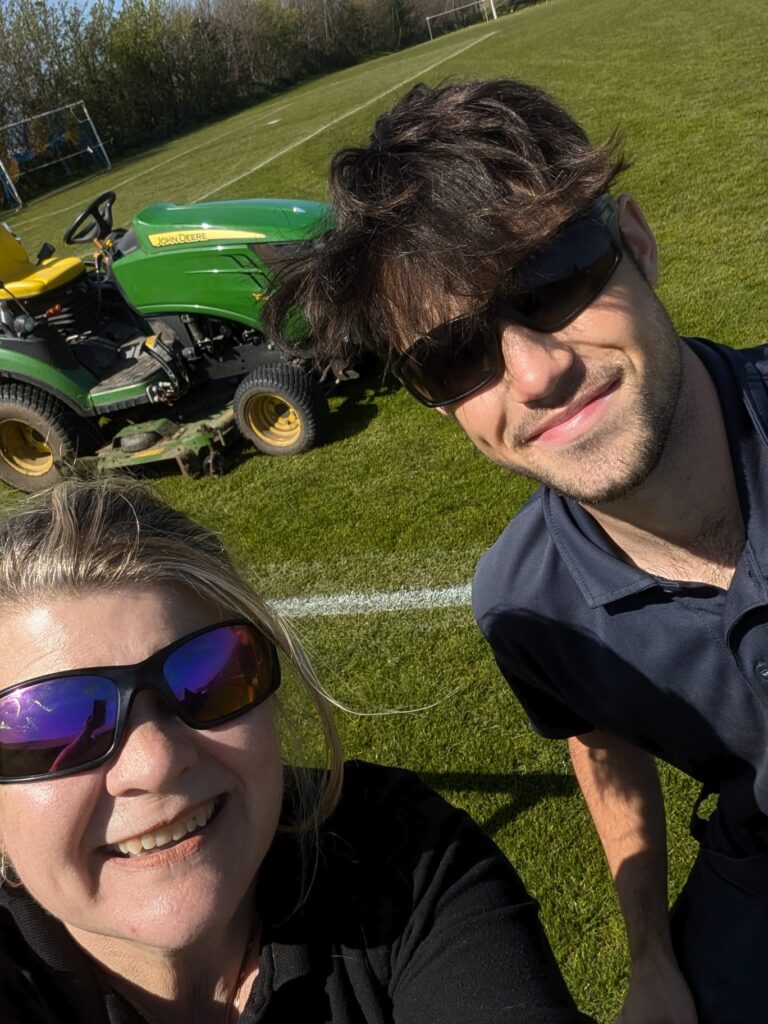
Q: You’ve spoken about the industry sometimes focusing too much on qualifications. Could you expand on that?
A: Qualifications are important, of course, but they aren’t everything. We can be too quick to dismiss people without formal training when in fact transferable skills are invaluable. What really matters is the person: are they reliable, adaptable, and passionate? Those qualities can’t be measured by a certificate.
Employers should see the potential in people and take responsibility for developing and upskilling them. I think we’ve become a little “snobby” as an industry, and that’s holding us back. We need to value different backgrounds and the unique qualities individuals bring to the table.
Q: You eventually transitioned back into education. What inspired that move?
A: When I returned to the UK, I wanted to give something back. I know what it’s like to struggle academically and feel like you’re not good enough. I’ve seen so many apprentices come to me thinking they’ll fail because school made them believe that. It breaks my heart because they’re capable; they just need to be taught in a way that makes sense to them.
For me, teaching is about making learning fun and building confidence. I’ve had an incredible life full of opportunities, even through tough times. Now, at this stage in my life, I want to nurture the next generation and show them they’re more capable than they realise.
Q: What do you see as the most rewarding part of teaching now?
A: It’s not about me anymore, and that’s the enjoyment. It’s about giving young people the same opportunities I’ve had, so they can build amazing careers too. When you look at some of the salaries now, like head gardener roles at £50,000 plus housing, or top sports turf positions in the Premier League, you think, wow, what opportunities there are. But to get students to that level, we need to nurture them and provide individualised learning. Not everyone learns the same way, and education has to adapt to that.
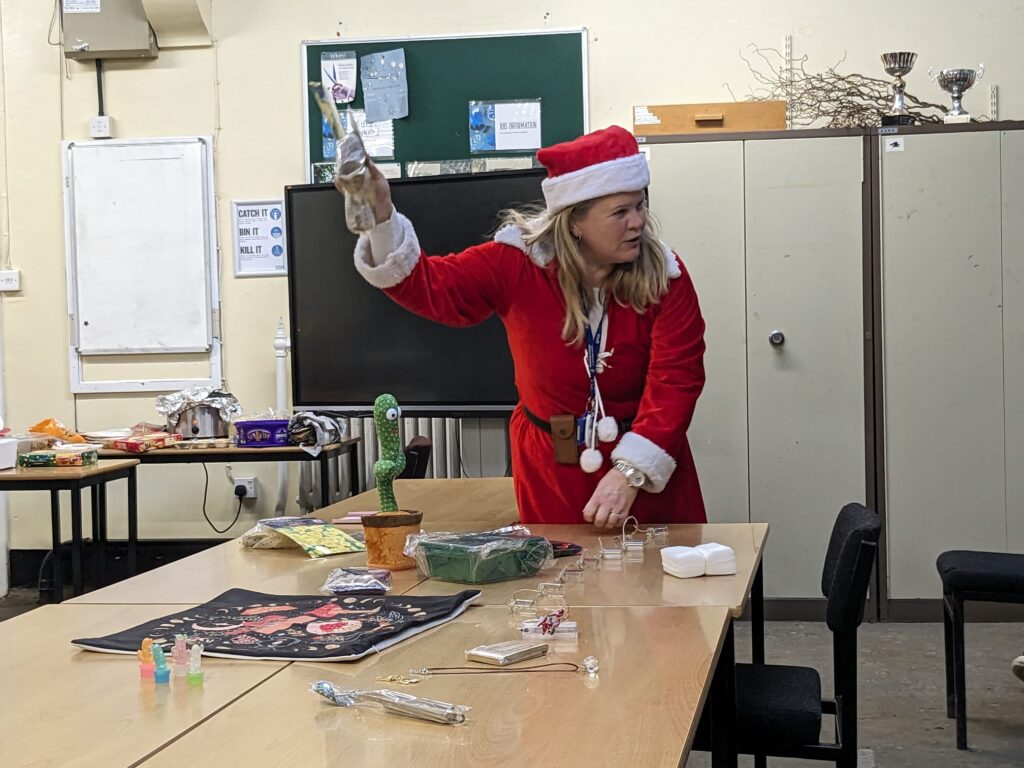
Q: What has been your biggest challenge in teaching?
A: The systems we work in. We talk a lot about equality, diversity, and inclusion, but in practice, education can still be very rigid. A classroom full of learners is full of individuals, and they need to be treated that way. You don’t have to spend hours in front of a PowerPoint for learning to happen. You can teach theory through practical sessions, getting learners to demonstrate and problem-solve as they go.
I’ve also been very lucky that the industry has supported me. In the last five years, I’ve been able to take students out on trips, giving them the kind of hands-on experience that’s so much more powerful than sitting in a classroom. And when you look at the national apprenticeship achievement rate being as low as 65%, it’s clear something isn’t working in the current system. We need to ask ourselves why.
Q: If you could change one thing to make the industry more inclusive, what would it be?
A: Being open-minded. Too many people have pre-formed opinions and assumptions, and they really shouldn’t.
Q: What advice would you give to the industry regarding skills and opportunities?
A: Give someone a chance. You’ll be surprised by what people can do. Some students or employees may leave the industry, but without that first opportunity, they wouldn’t have reached that point in their careers. Even if they leave, they retain their skills and qualifications, and they might come back.
Q: What has been your proudest moment in your career so far?
A: It changes week by week. Sometimes it’s when my children acknowledge what I’ve done. Taking on work in sports turf was daunting because I had never managed turf before. Seeing my son-in-law work on my website and saying, “You didn’t do that,” reminded me of my achievements. Another proud moment was attending a National Garden Scheme open garden where a former apprentice of mine, now promoted to Senior Gardener, was leading a tour. She shouted out, “That’s my tutor,” referring to me, and I realised she felt as proud of me as I was of her.
Q: What inspired you to pursue a career in sports turf?
A: In Asia, I didn’t have role models in sports turf, and as a woman in horticulture, I had very few. Charlie Dimmock was one of the closest role models. Now, I’m inspired by people like Ian Lucas at AFC Bournemouth, Scott Marshall and David Newall at Reading Football Club, Simon Moore of Fleet Line Markers, and Robert Jackson of Howardson Group. They’re all fantastic role models, especially when it comes to developing skills in the industry and supporting young people and career changers.
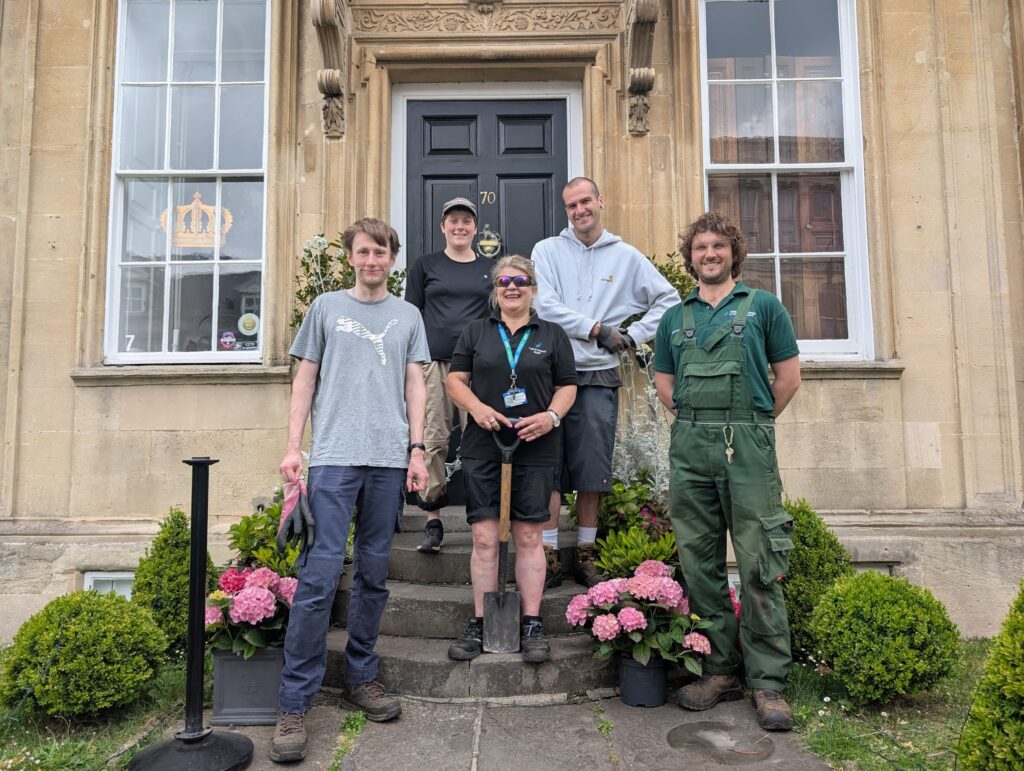
Q: What’s your favorite part of working within the sports turf sector?
A: Collaboration. It’s about the student, the employer, and ourselves working together. I value the camaraderie, trust, respect, and faith we build. That supportive network has contributed to high achievement rates among students.
Q: If you could switch roles with anyone else in the industry for a day, who would it be and why?
A: Honestly, I’d probably go with the head of grounds at Arsenal Football Club. That’s a dream job. I’d give anything to work there for a day. Another person would be Joseph Sturrock-Spencer from David Austin Roses. Having worked across so many sectors, it’s incredible to show learners behind-the-scenes tours, like at the rose breeding programme at David Austin. Meeting people like that, celebrating them, putting them on LinkedIn—it’s important.
Q: How do you unwind and relax after a challenging day?
A: I listen to a lot of music. It touches different parts of your soul—happy, sad, angry, crazy. I love ACDC. One of my favorite memories with my kids was taking my son to see them in Melbourne. I even got a cherry tattoo on my ankle as a memory because they didn’t have a t-shirt. Moments like that are precious. Work is important, yes, but family, friends, and life experiences matter just as much. When you enjoy your job, it doesn’t feel like work—it feels like getting paid to pursue a hobby.
Q: What’s been the most unexpected moment in your career?
A: There are quite a few. Some I can’t talk about because they involve high-profile clients. But I’ve had moments where you have to pinch yourself, realizing you’re operating at a high standard of excellence. It’s a reminder to celebrate your achievements and to acknowledge great work. Fun and camaraderie are key, too.
Q: What advice would you give to new people wanting to join this industry?
A: Ask questions. If there’s a company you admire, reach out—ask to have a try-it day or to speak with someone. Don’t be frightened. The only barriers are the ones you put up yourself. Try different roles and explore your interests, and always make use of associations and networks.
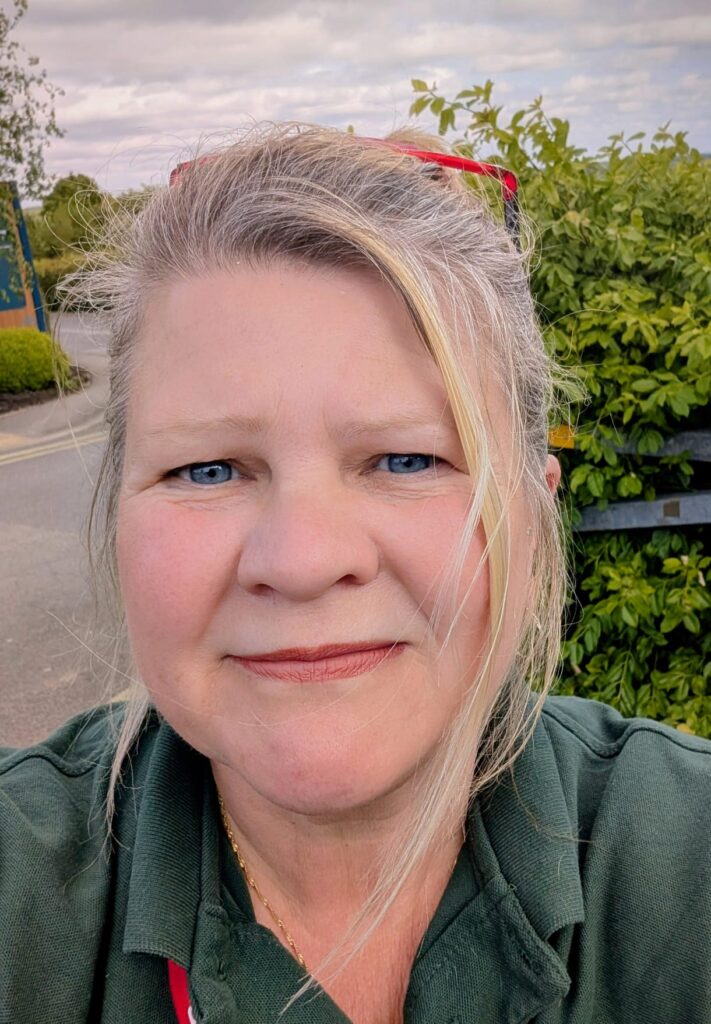
Q: What would you say to people considering working with International Greenkeepers For Hire?
A: The experience of working internationally is incredible. You learn about different cultures, environmental conditions, and sustainable practices that you can bring back home. Overseas experience builds transferable skills and confidence, and it also introduces you to amazing friendships and, of course, great food.
Q: Can you tell us a bit about your next steps and your new business venture, Intropica?
A: Intropica is inspired by my love for tropical flowers. I’ve planted and worked with some of the most beautiful exotic plants in the world, and I’ve also done a lot of artwork. Intropica represents all of that—my passion, creativity, and everything I’ve nurtured over the years. It’s based on my belief of how good education should be delivered. That’s what I want to be part of: making sure what we deliver is industry-led, and that it’s enjoyable, fun, engaging. I also get asked a lot for bespoke training courses, like pruning and lawn maintenance, so hopefully, we’ll be developing some good training going forwards.
